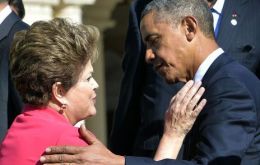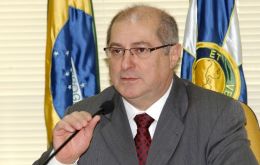MercoPress. South Atlantic News Agency
United States
-
Tuesday, September 10th 2013 - 00:47 UTC
Spying on Petrobras: if proven its ‘industrial espionage’ warns Rousseff

Reports that the United States spied on Brazilian oil company Petrobras, if proven, would be tantamount to industrial espionage and have no security justification, Brazil's President Dilma Rousseff said on Monday.
-
Tuesday, September 10th 2013 - 00:42 UTC
BRICS agree on a 100bn ‘financial firewall’ in anticipation of ‘currency shocks’

BRICS nations (Brazil, Russia, India, China and South Africa) have agreed to a 100 billion dollars currency reserve pool as a “financial firewall” in anticipation of liquidity strains and ‘currency shocks’ as the United States Federal Reserve moves to reduce monetary stimulus.
-
Saturday, September 7th 2013 - 02:08 UTC
Depending on Obama Wednesday’s reply, Rousseff will decide on her visit to Washington

Brazilian President Dilma Rousseff, angered by a recent report that the US government spied on her communications, said on Friday that President Barack Obama had taken responsibility for what happened and that she may proceed with a planned visit to Washington next month.
-
Saturday, September 7th 2013 - 02:03 UTC
Brazil investing millions in improving security of its communications to avoid US dragnet

Angered by recent revelations that the United States spied on its emails and phone calls and even its president, Brazil's government is speeding up efforts to improve the security of its communications - and hopefully keep more of its secrets under wraps.
-
Thursday, September 5th 2013 - 03:50 UTC
US economy grows at 2.5% in second quarter; August sales car in six-year high

The US economy grew at an annualised pace of 2.5% in the second quarter of the year, the Commerce Department said in revised figures. That was more than double the pace recorded in the previous three months, and above estimates of 2.2%.
-
Thursday, September 5th 2013 - 02:36 UTC
Brazil to probe telecom companies for possible sharing of info with US spies

Brazil will probe telecommunications companies to see if they illegally shared data with the United States National Security Agency after it was found the US had been spying on President Dilma Rousseff. Brazil’s government has accused the US of lying about the NSA’s activities in the country.
-
Thursday, September 5th 2013 - 02:13 UTC
S&P claims lawsuit is US government ‘retaliation’ for downgrading credit rating

Ratings agency Standard and Poor's (S&P) has claimed the lawsuit filed against it by the US Justice Department was “retaliation” against its decision to downgrade the US's credit rating.
-
Thursday, September 5th 2013 - 01:59 UTC
Advanced economies taking the global relay from emerging countries, says IMF

Advanced economies led by the United States will increasingly drive global growth while emerging countries are at risk of slowing due to tighter US monetary policy, the IMF said in a note according to Reuters news agency.
-
Tuesday, September 3rd 2013 - 01:33 UTC
Journalist Greenwald promises more revelations on the NSA spying network

The US National Security Agency also intercepted text messages by Mexico’s Enrique Peña Nieto in which the then-presidential front-runner discusses two possible cabinet picks, journalist Glenn Greenwald said on Sunday night’s show ‘Fantastico’, citing a 24-slide presentation. Peña Nieto assumed office in December 2012.
-
Tuesday, September 3rd 2013 - 01:29 UTC
Brazil outraged with NSA spying waiting for a ‘satisfactory reply’ from Obama

Brazilian president Dilma Roussef is considering at least three reactions to the US government following allegations that the US National Security Agency, NSA, spy program targeted the president, her ministers and advisors as revealed by the O Globo television program ‘Fantastico’. Earlier on Monday US Ambassador Thomas Shannon was summoned by Foreign minister Luiz Alberto Figuereido.
